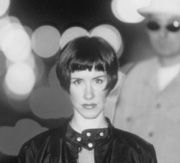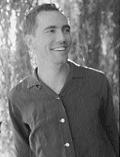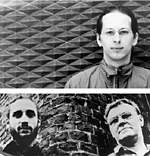MUSICAL CREATION doesn’t exist in a vacuum. Most artists aren’t shy about acknowledging at least a few influential predecessors, but for some musicians, their fandom suffuses every note they produce. Groups such as the High Llamas and Stereolab have mined their own record collections for ideas, but exited the recording studio with albums that are equal parts homage and inspiration. Another such band has recently emerged: Scotland’s Adventures in Stereo, who are about to make their live debut stateside. Though the tastes of the band’s songwriter and guitarist, James Beattie, are wide-ranging, his recent albums betray a deep fascination with the Beach Boys’ revered Pet Sounds and the chiming arrangements of Phil Spector. If that’s your cup of tea, you’ll want to rush out and pick up Monomania, their second album for Chicago indie label Bobsled.
Adventures in Stereo
Graceland, Tuesday, September 19
Beattie, talking on the phone from his home in Glasgow, is only too happy to chat about his influences. “I’m not a record collector, I’m a record buyer,” he insists. “I just love listening to music.” Born in 1963, Beattie flirted with the chart-toppers of the day—the Beatles, the Stones, Bowie—before latching on to punk rock. “I was just the age for punk rock; I think I was 13. I was into Sex Pistols, the Clash, Subway Sect, Buzzcocks, early Generation X.”
That was only the beginning of what would become a life-consuming passion, as Beattie moved from the Jam to the Kinks and the Beatles to the American psychedelic rock of the Seeds and the 13th Floor Elevators. From there, he dug deeper: “I started really getting into the Beatles, really getting into the Beach Boys.” And that’s clearly when things started to click for the budding songwriter and guitarist.
His tastes may have snaked through the Byrds—”I think Gene Clark is just a genius”—to Burt Bacharach and the Motown bands to Sly & the Family Stone and Elvis Presley to the progressive sounds of Can and Public Image, Ltd. “One of my favorite LPs of all time is probably Metal Box,” he says.
But the blueprint for his songwriting lies in the winsome melodies, breezy arrangements, and dreamy lyrics of the Beach Boys and Spector’s bands. In 1984, Beattie cofounded Primal Scream. That band has since has gone on to Madchester-influenced beats and snarling, Exile on Main Street– drenched guitar licks, but the Primals’ early output had a major impact on Britain’s budding Creation Records scene and, later, the early ’90s American bands who followed in their footsteps.
In fact, the band Velocity Girl named itself after a catchy Primal Scream song, and Beattie, who left the band in 1987, named his next group after another Primal Scream song, an adrenaline-boosting instrumental called “Spirea-X.” Spirea-X marked his first musical collaboration with his soon-to-be girlfriend Judith Boyle, whose whispery vocals hang like a light fog over every Adventures in Stereo song. Spirea-X released one album, 1992’s Fireblade Skies, on 4AD, and stayed together only a year. As Beattie recalls, “The rest of the band wanted all the glory without any work, and I just hate laziness. So I disbanded them.”
BEATTIE RETREATED and regrouped. While making demos on his four-track, he once again called on Boyle, who sang atop his new songs—patchwork creations sewn from samples that reeked of ’70s AM pop, plus bits of guitars and hand claps. The pair released a handful of singles as Adventures in Stereo and collected them on a self-titled album, released in 1997. That was followed by another self-titled album—its artwork similar to the first one, but with a yellow design rather than a blue one—which Beattie calls a bootleg. “Our ex-manager brought that out. It’s actually Spirea-X demos,” he laments. “I would not have released those tracks at all.”
Beattie’s next step was to abandon the sample-based style and return to an organic lineup. “Loads of people were asking us to play gigs, so we got a group together. I’d written all these new songs, and we decided to record them with the new group,” he explains. The result was 1998’s Alternative Stereo Sounds, which was followed by Monomania, released last month. Both glow with Beattie’s influences but achieve their own distinct personalities.
“In reviews, people have said, ‘It reminds me of a time, but I can’t put a finger on it.’ And it’s probably because there are so many influences from so many different eras of music,” notes Beattie. “There was one song I was really worried about on Monomania, and that was ‘This Day.’ It’s got this Hammond organ break, and I thought, Shit, that’s ‘Good Vibrations’! I can’t do that. So I played ‘Good Vibrations’ back to back, and it’s not. Phew! It’s just got that feel.” Beattie links Monomania‘s “We Will Stand” to the Bobby Fuller Four, tagging it “a bebop song, like a ’50s driving sort of thing,” and he calls “International” “my note to Gene Clark— a big note.”
“I’d be really happy if I could write songs halfway as classic as the groups that I’ve mentioned,” admits Beattie, who never loses sight of his fan status. “That’s the only reason I make music. I mean, I would go buy Monomania because I haven’t heard a group that has done Monomania.”
Spoken like a true music junkie.








